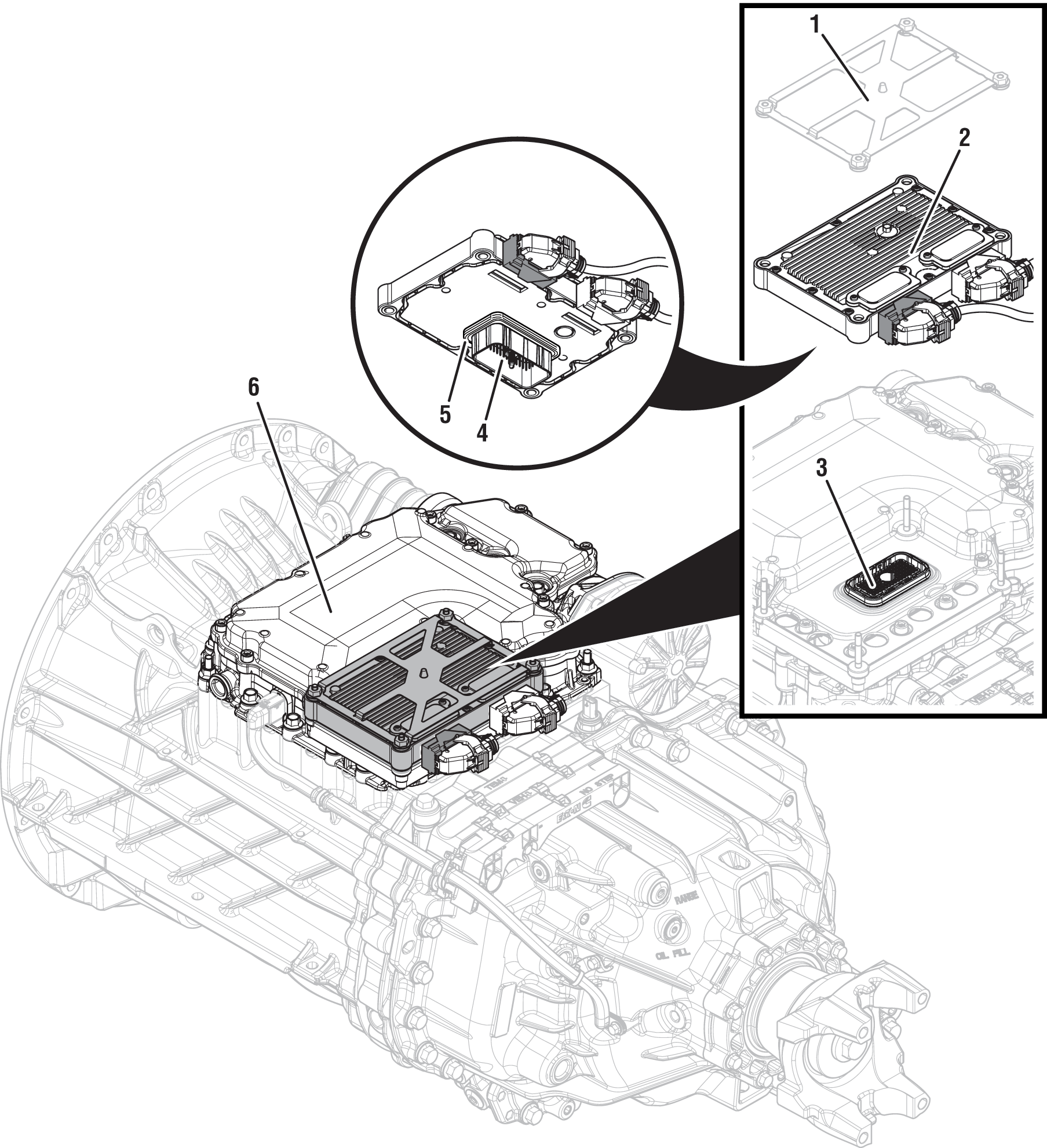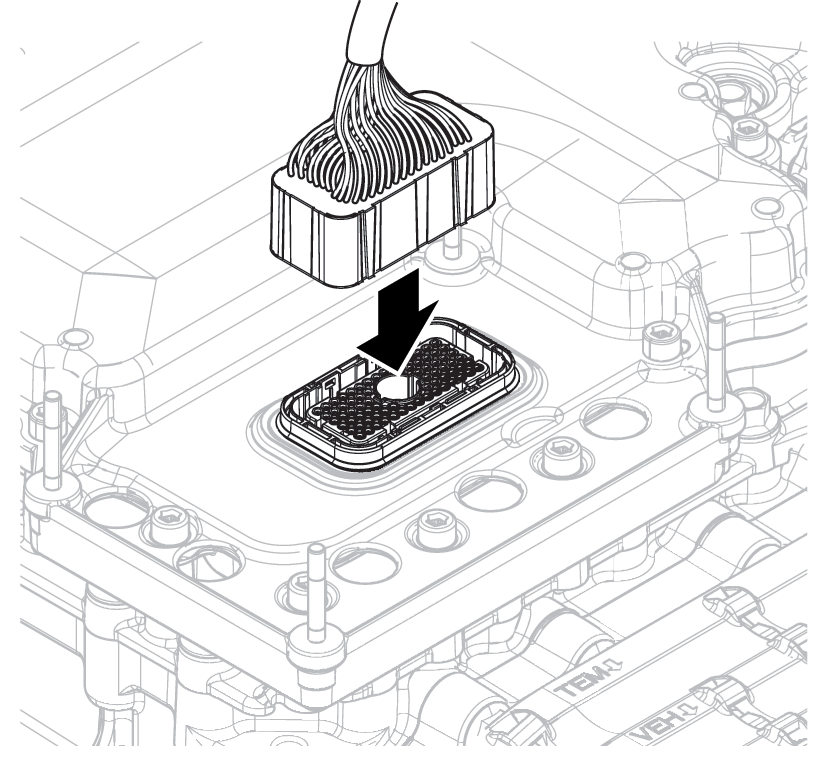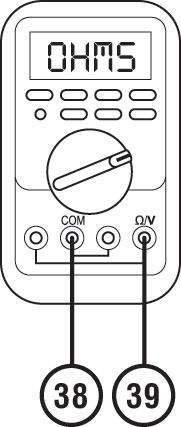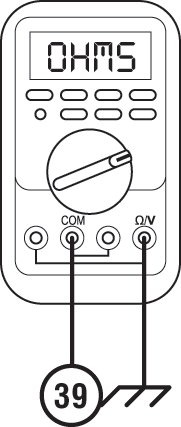Fault Code 596: Rail B Fore Solenoid (A5)
J1939: SA 3 SPN 5901 FMI 0, 1, 3, 4, 5, 6, 7, 8, 12, 14, 16, 17, 18, 31
Overview
The Endurant XD Series transmissions are equipped with solenoid valves that direct vehicle Supply Air to and from the shift rail cylinders in the Mechatronic Transmission Module (MTM). Movement of each shift rail is controlled 2 solenoids; a Fore and a Aft.
The Rail B Fore Solenoid (RBFS) valve is energized by the Transmission Control Module (TCM) to direct Supply Air to the Shift Rail B Cylinder to move the Rail B Shift Yoke and Rail B Synchronizer in the fore or forward direction. The RBFS valve is located in the MTM and connected to the TCM at the 74-Way Transmission Harness Connector.
Detection
The TCM monitors the RBFS circuit and Shift Rail B position. If a system failure is detected, the fault is set Active.
Conditions to Set Fault Code Active
FMI 0 – Data Valid But Above Normal (Most Severe): RBFS Low-Side Current value greater than commanded current for 1 second.
FMI 1 – Data Valid But Below Normal (Most Severe): RBFS Low-Side Current value less than commanded current for 1 second.
FMI 3 – Voltage Above Normal or Shorted High: RBFS circuit shorted to power for 2 seconds after RBFS commanded off.
FMI 4 – Voltage Below Normal or Shorted Low: RBFS circuit shorted to ground for 2 seconds after RBFS commanded off.
FMI 5 – Current Below Normal or Open Circuit: RBFS circuit open for 2 seconds after RBFS commanded off.
FMI 6 – Current Above Normal or Shorted Circuit: RBFS circuit shorted to ground for 2 seconds after RBFS commanded on.
FMI 7 – Mechanical System Not Responding: Rail B Position value and speed sensors confirmed uncommanded movement from Splitter Gear toward neutral position.
FMI 8 – Abnormal Frequency: RBFS signal frequency out of range for 1 second.
FMI 12 – Bad Intelligent Device: TCM has detected an internal processing error.
FMI 14 – Special Instructions: Rail B Position value indicated uncommanded movement from neutral position toward Main Drive Gear Low immediately after a shift into neutral position.
FMI 16 – Data Valid but Above Normal (Moderately Severe): RBFS commanded on longer than expected increasing solenoid temperature.
FMI 17 – Data Valid but Below Normal (Least Severe): Rail B Position value and speed sensors confirmed uncommanded movement from Splitter Gear toward neutral position.
FMI 18 – Data Valid but Below Normal (Moderately Severe): RBFS circuit voltage lower than expected for 1 second after RBFS commanded on.
FMI 31 – Condition Exists: During a rail calibration, Rail B Position value indicated uncommanded movement from neutral position toward Main Drive Gear Low immediately after a shift into neutral position.
Fallback
FMI 0, 1, 5, 6, 8, 12, 16, 18:
- Amber warning lamp on
- If Shift Rail B is in neutral position
- Shift Rail B movement prohibited
- If Shift Rail B is not in neutral position
- Shift Rail B movement in fore direction prohibited
- Shift Rail A movement prohibited
FMI 3, 4:
- Amber warning lamp on
- Shift Rail B movement prohibited
- Shift Rail A movement prohibited
FMI 7:
- No degraded modes
FMI 14, 31:
- Amber warning lamp on
- Shift Rail B movement prohibited
FMI 16:
- Amber warning lamp on
- Shift Rail B movement in fore direction prohibited
FMI 17:
- Amber warning lamp on
- Splitter Gear engagement prohibited
Conditions to Set Fault Code Inactive
FMI 0, 1, 6, 7, 8, 12, 14, 16, 17, 18, 31: Key cycle and fault condition no longer exist.
FMI 3: RBFS circuit not shorted to power for 10 seconds.
FMI 4: RBFS circuit not shorted to ground for 10 seconds.
FMI 5: RBFS circuit not open for 10 seconds.
Possible Causes
FMI 0, 1, 3, 4, 5, 6, 8, 16, 18:
- MTM - RBFS
- Internal failure
- Damaged
- MTM - Transmission Harness
- Wiring shorted to power, shorted to ground or open
- TCM
- Internal failure
FMI 7, 14, 17:
- MTM - RBFS
- Partially stuck open
- Internal transmission
- Splitter Gear
- Rail B Synchronizer
FMI 12:
- TCM
- Software issue
- Internal failure
FMI 31:
- MTM - RBFS
- Partially stuck open
Additional Tools
- Endurant XD Service Manual TRSM0960
- Eaton Breakout Box with 74-Way Eaton Diagnostic Adapter - RR1029TR
- Digital Volt/Ohm Meter (DVOM)
- Rail B Synchronizer Engagement Tool (RR1088TR)
Component Identification
 |
1. Transmission Control Module (TCM) Cover 2. Transmission Control Module (TCM) 3. 74-Way Transmission Harness Connector (TCM-side) 4. 74-Way Transmission Harness Connector (MTM-side) 5. Transmission Control Module (TCM) Seal 6. Mechatronic Transmission Module (MTM) |
Fault Code 596 Troubleshooting
Set vehicle parking brake and chock wheels.
Record transmission fault codes, FMIs, occurrences, and timestamps from Service Activity Report created during the Diagnostic Procedure.
If Fault Code 596 FMI 0, 1, 3, 4, 5, 6, 8, 16, 18 is Active or Inactive, Go to Step B
If Fault Code 596 FMI 12 is Active or Inactive, Contact Eaton Cummins Automated Transmission Technologies for further diagnostic instructions. For Help Line phone numbers, go to Contact Information. Go to Step V
If Fault Code 596 FMI 7, 31 is Active or Inactive, go to TAIB-1006 MTM Solenoid Fault Codes and Vehicle Air System Contamination.
If Fault Code 596 FMI 14 is Active or Inactive, Go to Step E
If Fault Code 596 FMI 17 is Active or Inactive, contact Eaton Cummins Automated Transmission Technologies for further diagnostic instructions. For Help Line phone numbers, go to Contact Information. Go to Step V NOTICE: Refer to Vehicle Maintenance Recommendations in TRSM0960 regarding vehicle air system requirements to ensure proper air supply and air quality.
Key off.
Remove TCM from MTM with 20-Way TCM Vehicle Harness Connector and 20-Way TCM Body Harness Connector connected.

Inspect TCM side of the 74-Way Transmission Harness Connector, verify connector is free from contamination and corrosion; terminals are not bent, spread or loose; and there is no damage to connector body.
Inspect TCM Seal, verify seal is properly installed and not damaged.
If contamination or damage is found, replace Transmission Control Module (TCM) and Mechatronic Transmission Module (MTM). Go to Step V
Note: MTM removal and installation requires transmission be removed from vehicle. Reference Endurant XD Service Manual TRSM0960, Transmission Removal Service Procedure.
If no contamination or damage is found, Go to Step C
Key off.
Connect Eaton Breakout Box with 74-Way Eaton Diagnostic Adapter to MTM side of 74-Way Transmission Harness Connector.

Measure resistance at Eaton Breakout Box between Pin 38 and Pin 39. Record reading in table.

Measure resistance at Eaton Breakout Box between Pin 39 and Ground (TCM mounting stud). Record reading in table.

Compare reading(s) in table.
If readings are in range, Go to Step D
If readings are out of range, replace Mechatronic Transmission Module (MTM). Go to Step V
Note: MTM removal and installation requires transmission be removed from vehicle. Reference Endurant XD Service Manual TRSM0960, Transmission Removal Service Procedure.
| Pins | Range | Reading(s) |
|---|---|---|
| 38 to 39 | 3.4–5.5 Ohms | |
| 39 to ground (TCM mounting stud) | Open Circuit (OL) |
Key off.
Remove Eaton Breakout Box 74-Way Eaton Diagnostic Adapter.
Reinstall TCM to MTM.
Reconnect all connectors and verify all components are properly installed.
Key on.
Connect ServiceRanger.
Retrieve and record transmission fault codes, FMIs, occurrences, and timestamps.
If Fault Code 596 FMI 0, 1, 3, 4, 5, 6, 8, 16, 18, 31 is Active, replace Transmission Control Module (TCM). Go to Step V
If Fault Code 596 FMI 0, 1, 3, 4, 5, 6, 8, 16, 18, 31 is Inactive, replace Mechatronic Transmission Module (MTM). Go to Step V
Note: MTM removal and installation requires transmission be removed from vehicle. Reference Endurant XD Service Manual TRSM0960, Transmission Removal Service Procedure.
Key off.
Remove MTM.
Note: MTM removal and installation requires transmission be removed from vehicle. Reference Endurant XD Service Manual TRSM0960, Transmission Removal Service Procedure.
Inspect Main Drive Gear Low for excessive fore and aft movement.

Inspect Splitter Gear for excessive fore and aft movement.
If excessive gear movement is evident, inspect Main Shaft Assembly for cause and repair. Go to Step V
If no excessive gear movement is evident, Go to Step F
Inspect Rail B Synchronizer Sliding Sleeve yoke slot for wear.

Install the Rail B Synchronizer Engagement Tool (RR1088TR).
Note: Reference Appendix, Manually Actuate Rail B Procedure.
Shift Rail B Synchronizer Sliding Sleeve into neutral (if necessary).
Shift Rail B Synchronizer Sliding Sleeve into Main Drive Gear Low engagement position (fore).
Inspect Splitter Gear and Rail B Synchronizer Sleeve clutching teeth for wear.
Return Rail B Synchronizer Sliding Sleeve to neutral position.
Shift Rail B Synchronizer Sliding Sleeve into Splitter Gear engagement position (aft).
Inspect the Splitter Gear and Rail B Synchronizer Sliding Sleeve clutching teeth for wear.
Return Rail B Synchronizer Sliding Sleeve to neutral position.
If Rail B Synchronizer Sliding Sleeve shifts into all three positions and no clutching teeth wear is present, replace Mechatronic Transmission Module (MTM). Go to Step V
If Rail B Synchronizer Sliding Sleeve does not shift into all three positions or clutching teeth wear is present, replace Rail B Synchronizer Assembly, Main Drive Gear Low, Splitter Gear and Mechatronic Transmission Module (MTM). Go to Step V
Key off.
Reconnect all connectors and verify all components are properly installed.
Key on with engine off.
Connect ServiceRanger.
Go To “Fault Codes”.
Select “Clear All Faults”.
Operate vehicle and attempt to reset the fault code or duplicate the previous complaint.
Check for fault codes using ServiceRanger.
If no fault codes set and vehicle operates properly, test complete.
If Fault Code 596 sets Active, Go to Step A
If a fault code other than 596 sets Active, troubleshoot per the Fault Code Isolation Procedure Index